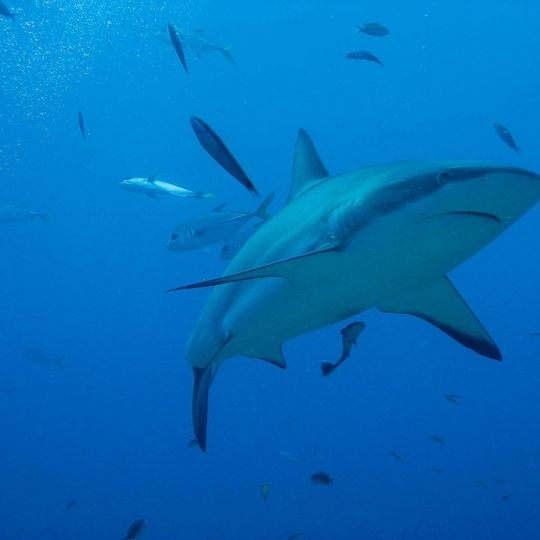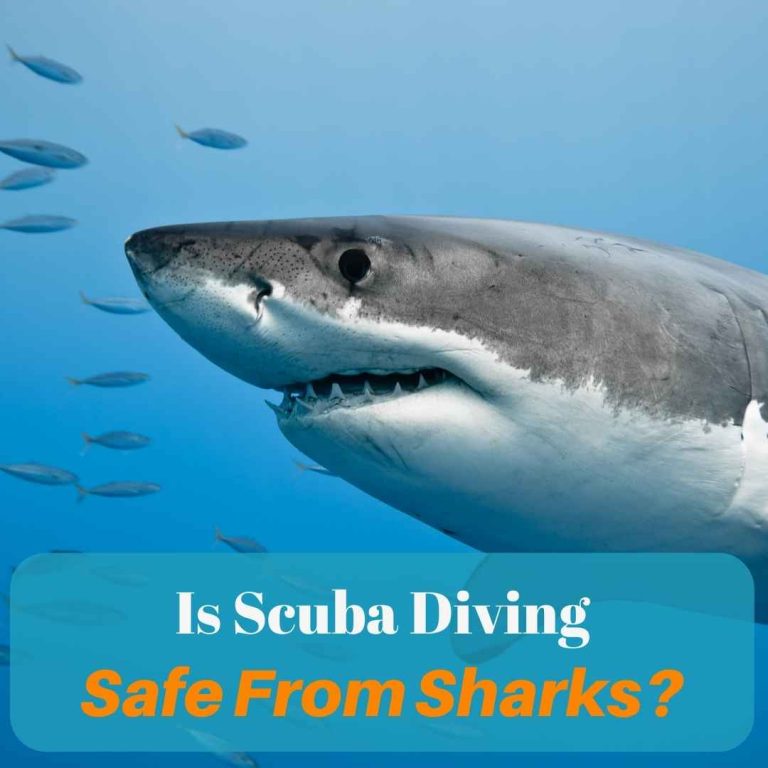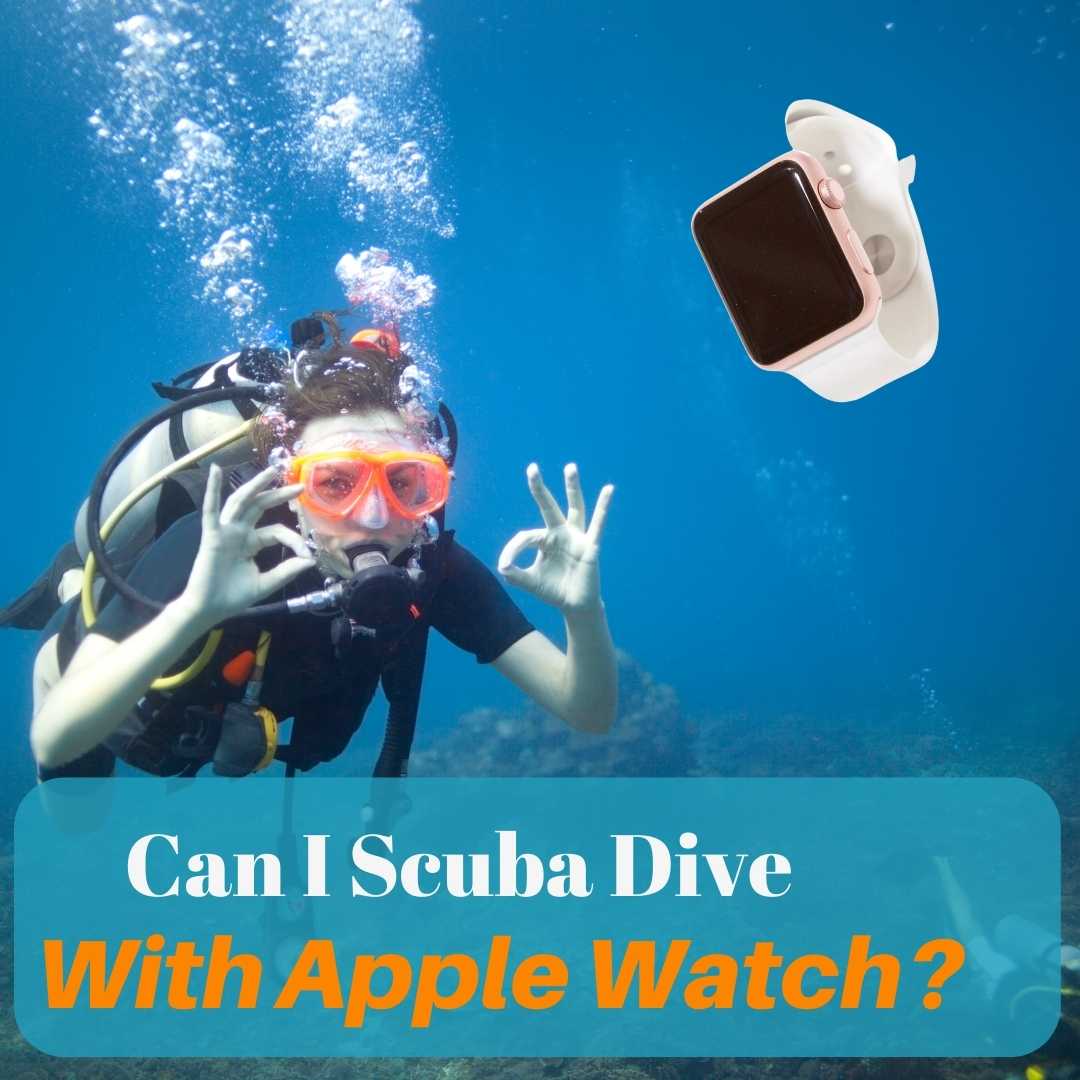If you yelled “shark” on a crowded beach, you may cause a stampede of people rushing to leave the water. Yell the same word on a dive boat and everyone will look for their cameras. If you were to look at diving fatalities, you will see all sorts of reasons from poor diver health and procedural errors to lack of training and equipment problems but it would be extremely hard to find diving fatality that is due to shark attack!
With the right special effects, a shark attack can look really cool in the movies but in real life, it would be something extremely rare.
The short answer is – yes, scuba diving is generally extremely safe from an out-of-the-blue shark attack!
Table of Contents
What Are the Chances of Seeing a Shark While Scuba Diving?
Most divers would love to come across a shark and when that moment happens, it is one of the most exciting moments in your life but the chances of seeing a shark, depend upon where you are diving. If you were to do some random dives hoping to come across a shark, then you may not be very lucky but there are some dive destinations that offer anywhere from very high to almost guaranteed shark sightings.
Galapagos and Cocos Islands are two of the top shark destinations in the world. A wide range of shark species can be dived within these two destinations, including tiger sharks, hammerhead sharks, Galapagos sharks, whale sharks, silky sharks, silvertip sharks, white tip reef sharks, and black-tip sharks! If you go on a liveaboard dive trip to either of the two places, shark sightings are almost guaranteed!
In Protea banks and Aliwal Shoal in South Africa also have their reputation as places with almost guaranteed shark encounters while Morehead City in North Carolina offers a very high chance of seeing sharks on some of its historic wrecks between the months of May to September.

Do Sharks Attack Scuba Divers?
It has happened but it is very rare. Humans do not normally resemble the food that sharks eat so chances of a bite are rare. Keep in mind that of all the shark species that exist, most of the unprovoked attacks on humans can be attributed to only three species. These are Great White, Tiger, and Bull sharks.
Thousands of dives are made with other shark species around the world and divers will be safe. In Fiji islands and South Africa, divers routinely dive with Tigers and Bulls on the feeding dives and these trips have become quite popular among divers but yes there have been cases of scuba divers being attacked by sharks.
How Many Scuba Divers Get Attacked by Sharks?
A total of 562 shark attacks happened in Australia, from the year 1960 to 2022. Out of these 62 were on scuba divers and eight of these were fatal. Great White was responsible for most of the 562 attacks.
According to the International Shark Attack File, 73 unprovoked shark attacks happened around the world in 2021. Out of these, 43 occurred in the United States. None of these were scuba divers and only 4% of the victims were snorkelers and free divers. Surfers comprised 51 percent of these attacks.

Why Are Scuba Divers Not Attacked by Sharks?
A great many sharks happen to be surface feeders. Surfers, paddlers, and wakeboarders are splashing on the surface, they are more likely to be confused by the predator as prey. Divers being at depth are more recognizable to the shark as not food.
Shark attacks often happen due to activities that free divers engage in, such as spearfishing, food collecting, etc. These make them relatively more vulnerable to a diver at deeper depths.
The bull shark is one of the top three species that are known for attacking humans. A study into their behavior shows that they prefer to hunt in shallow waters and this means that a beachgoer splashing closer to the shore or a surfer riding the waves is more vulnerable than a diver who is 60 feet below sea level. When divers encounter bulls at depth, they are in a less predatory state.
While most sharks are color blind, they can pick up bright contrast very well. Divers prefer to wear all black while surface swimmers and surfers wear bright flashy colors. These have a higher chance of provoking, what is considered a curiosity bite. Sharks are known to bite in order to investigate. Sometimes they just want to check things out!
Also Read: Do Black Wetsuits Attract Sharks?
How Do You Avoid Sharks when Diving?
Divers do not want to avoid them. Sharks are not serial killers and most divers understand this fact better than the general population that is watching “Sharknado.” If you are diving in an area where sharks are not common, then the chances of finding one during a dive are very rare.
If you are lucky enough to see a shark and decide that you want to avoid it then just hold your spot and keep your eyes on it. With the exception of the Sand-tiger shark, all others can not stay perfectly still so they must move in order to stay afloat. Chances are that it will disappear even before you pull out your camera if you choose to do so.
How Do Scuba Divers Deal with Sharks?
Most divers do not encounter sharks in a situation where they need to be “dealt” with. Divers Alert Network, a non-profit that is committed to dive medicine and the health of divers recommends that when encountered by a shark, divers should remain submerged.
Movements must be smooth and gradual, as sudden movement may generate an aggressive response. If it gets very close and starts acting curious then you can fend it off using a GoPro stick or any other accessory. Try not to hurt it if it has not hurt you otherwise it will get angry.
Avoid touching the shark with your bare hands. They may look very slippery but their skin feels like sandpaper. It can scratch your skin and cause bleeding which will generate a feeding response.
Sharks are often attracted to bright, contrasting accessories like surface marker buoys that divers may have on their bodies. Shiny objects may also catch their attention. Losing them in case of an encounter with an overly curious shark may cause them to chase these objects and leave you alone.
International Shark Attack File has issued its own advice to divers. In the case of spearfishing, the shark may get attracted due to the activity. It is important to realize that it is interested in your catch more than you. Let em’ have it! Drop your catch and exit the area.
If the shark attacks then playing dead does not help. You have to fight it off aggressively and the best way would be to hit the shark on the tip of its nose. Try to claw the eyes and the gill flaps as those are sensitive. This will cause the shark to disengage and swim away.
If it leaves, then you must swim away in smooth motion while keeping your eyes on the shark. Chances are that if it is an aggressive shark, then it will turn around and come back.
Conclusion
Sharks in real life behave much differently than sharks in the movies. Since most people have no direct interaction with these animals, they have an extremely exaggerated sense of danger. For divers, sharks are majestic sea creatures and there is a fair amount of dive tourism that is centered around providing encounters with sharks.
There are rare occasions where sharks have attacked divers, but since we do not resemble their food, such behavior is not typical. While divers have a lot of things to watch out for, such as nitrogen expansion in the body, carbon dioxide build-up, oxygen toxicity seizures, and decompression illness, etc. a shark attack is an extremely low cause of incidents among divers. This remains true even when divers dive with the sole purpose of encountering sharks, in areas that are known for their thriving shark populations.
There are steps that can be taken to minimize a shark’s interest in you and fear of sharks is not something that should keep you away from diving.
Sources
[1] https://www.floridamuseum.ufl.edu/shark-attacks/
[2] https://www.dansa.org/blog/2020/02/17/what-to-do-when-confronted-by-a-shark




